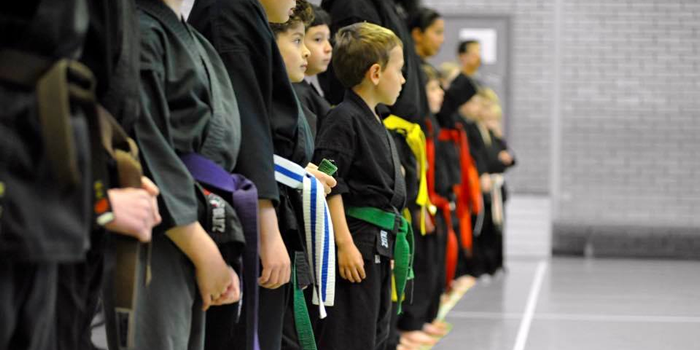What commitment is required of a karate-ka?
This is not something that people think about before commencing a “career” in karate or martial arts. The general assumption is that it is no different to any exercise class run by a gym. The general public upon considering a martial art hobby will appreciate that to excel, they will need to put time in. They will also make the assumption that its fine to dip in and out as life allows.
The fictional Mr Miyagi covers this in the first “The Karate Kid” movie with his statement, having been told by Daniel-san that he guesses he wants to do karate….
“Walk on road. Walk right side, safe. Walk left side, safe. Walk middle, sooner or later, get squish, just like grape. Here karate, same thing. Either you karate do, yes, or karate do, no. You karate do, guess so, [makes squish gesture] just like grape.
Now there is merit here.
- If you wish to do karate from a competitive perspective then, if you do not commit then you will lose and potentially risk injury during competition.
- If you wish to do karate for self defence (something i have mixed feelings about anyway, to be discussed in other posts), then not committing may well give you false sense of confidence above your capability, again risking injury in an altercation
- Most commonly however, if you do not commit but try to push yourself as hard as those who do, you are at a very high risk of injury due to your body not being prepared
This final point is more relevant at higher grades of 3rd kyu and above (in our dojos anyway).

However…
What about differences between dojos, instructors?
What about dojos that only offer limited hours of training each week?
What about “karate for all” as a concept and the fact that some just cannot commit due to family, work or health circumstances?
Firstly, all instructors and dojos are different. I have seen great karate-ka from dojo that only meet for an hour each week, likewise I have seen poor karate from people training 7 hours per week…. practice does not make per there is always the element of quality. I can therefore only comment within this post on how things are within our dojo. We have always made our expectations clear in both our syllabi and website (https://www.bushido-hombu.co.uk/members-area/commitment/). These are however only set as guidelines, not contractual agreements which is a subject I will end with.
So within our organisation, karate for all has always been my aim. This does however cause some compromise as a dojo leader, with a balance to be struck between dojo standard, progression of the dojo and making the dojo available for all. I have seen many instructors with very small numbers of members as they have taken the elitist approach to forcing commitment and only promoting and helping the naturally gifted, whereas I have seen others having to close their dojos after many years of running sessions and courses that end up only being partially attended due to the lack of commitment from members. Although many do not run dojos to make a profit, any dojo making continued losses will close when the lead ceases to fund it. (in my opinion why we have lost a lot of good sensei, while sub-standard “instructors” have built large organisations by selling a product).

So how do we make it work in our dojo? As with most things there are principles that I run the organisation by to achieve balance. I therefore consider the following factors:
- Our role as a guide, means we only give guidance as to what can be achieved through certain levels of commitment and training
- Our role as coach, to encourage and motivate commitment ensuring the rewards are in line with what is given
- Our role as leader, to ensure the financial security of the dojo and its continued existence
- Our role as grade examiners, to ensure the dojo aligns with capabilities and commitment levels to reduce the chance of injury and increase the opportunity for development at dojo and individual levels
- Our role as supporters, helping members to balance what they want against achievement of their goals
To put this in more simple terms.
We have a simple pricing structure that makes training available to all for minimal financial outlay, with the consistent nature of monthly dojo fees helping the dojo and members plan and accommodate changes in circumstances.
We also have the guidelines already mentioned in this post that ensure members know what they need to commit to if they wish to progress at an average rate.
Essentially, we give our members as much opportunity as our finances allow and understand that some will only be able to ever commit a small amount of training. This will be reflected in the grades they achieve over a timeline, but will never preclude them from training with us and remaining members/friends/family.
As a leader however, we need to try our hardest to have this as the exception rather than the normal as for the group to progress and continue to improve, we need the 80% of our members to commit to karate to the prescribed level… with hopefully 10% going above and beyond to be the future pioneers and developers of karate for the next generations.
